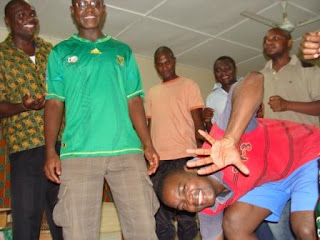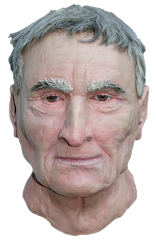Saturday, September 15, 2012
SCENES FROM DAILY LIFE
Thursday, September 13, 2012
Rex (2007-2012), RIP
Tuesday, August 21, 2012
FEEDING THE MARGINALISED
Each Friday we join the four regular volunteers and work with them. We have been inspired by the attitude of the workers at the feeding program. They are punctual and hardworking, and have a loving heart for the work. They have motivated us by freely involving us in the work. This has helped us to build a good relationship with them, and so make the ministry a very satisfying experience.
Elly Sakwa and Lewis Musonda
Wednesday, July 25, 2012
YUMBA SPECIAL SCHOOL
For the three of us novices who have worked at Yumba last year and this year, working there asks for patience, courage and commitment. Most of all, it asks for a heart of love of God and the poor. It is indeed a hurdle when you are not trained to work with such people, but with a heart that sees God in others, especially the marginalised, it becomes a life-changing story.
Language was our main limitation in terms of communication, but we came face to face with the reality that, for the mentally challenged, for whom talking is far from the first thing they do, love can change lives to respond positively. That is what we experienced. We saw change and improvement as a positive outcome of the love they received from the teachers as well as from each other. We witnessed the beauty of God in how caring the students themselves can be to each other in school. It is something that challenged how we as “able” people treat those living with disabilities
Wednesday, June 13, 2012
ONCE UPON A TIME UNDER A MANGO TREE
Wednesday, May 16, 2012
VISIT OF THE CONGREGATION LEADER, BR. PHILIP PINTO
Many Brothers and others around the world have experienced Philip’s simple yet personal and profound way of presenting a vision of the Christian Brothers and their vocation in today’s world and church. Philip made time during his visit for the Team, Brothers Kevin, Con and Tony, and especially the novices. Philip not only led a retreat day for the novices, but spent the best part of two mornings interacting with them in class.
Philip sketched the journey of the Congregation over recent decades towards a more dynamic and comprehensive understanding of God, the universe and our calling within our changing world. Many of his lines are still echoing in our conversations and hearts:
“Keep alive the dangerous memory of Jesus!”
“You don’t have to be a Christian to be God’s person.”
“The earth is God’s agenda.”
He challenged us very personally - to make the connection between prayer and our deepest desires; to let ourselves see things in a different way; to be honest with ourselves and to speak the truth. He left us wondering about this “bigger God” and about what sort of “alternative” we Christian Brothers are called to offer in the church and world. He urged us to find creative ways of living out our congregational motto of Presence, Liberation and Compassion.
Thank you, Philip. We know that you won’t be able to come again to Tamale this year, but we look forward to next meeting as Brothers, wherever and whenever that may be.
Wednesday, April 25, 2012
A Unique Way of Life
We have all been very pleased with the experience of a full week’s work in our respective ministries, whereas last year we were at ministry on just one day a week. We have been enriched through the daily encounters at ministry and these experiences have really helped us to grow in awareness of the social conditions of the people with whom we are working. We learned to be attentive and open to the needs of those we minister to. All of us came home each day with experiences that were shared with the community so that our ministry experiences became also central in our community sharing.
Prayer was the centre of our community life and was like the fountain from which we got the inspiration to go into our ministries each day. From our sharing in prayer, each of us was challenged and invited to continue to listen to and for God both in the community and at the ministry site. Each of us brought his gifts and uniqueness into how he facilitated prayer. Each day we were grateful for our experiences of the “Holy Mystery” even though we never understood this “Holy Mystery” fully.
Below: (from left) displaying the Choggu team strip are Victor, Elly, Amos and Lewis. Now Daniel is lost!
Hospitality was very much part of our community experience. Our door was not only open to familiar faces, but also to people of different creeds. We had Christian and Muslim friends alike coming to our community for a meal and that was a tremendous encounter. Our Muslim friends still talk about how hospitable and open we were to them as young men not only of a different faith but from other cultures as well. One thing that amazes our Muslim friends was how people from different cultural backgrounds could live together in one house and eat and drink as if coming from the same parents. For our community this compliment was indeed a blessing. To us, this is a reflection from others indicating the kind of community we not only live in but a community that we value as a way of life and not just a place.
Each of us have come out of the three months with something very significant to our own growth, spiritually, socially, emotionally and intellectually. We enjoyed the three months – though it was not without challenges – and we look forward to the reality of community living in our respective countries when we pack our bags from Br. Paul Noonan Formation House at the end of 2012.
Saturday, February 11, 2012
COMMUNITY PASTORAL PLACEMENT

One community is at Choggu and the other at Gurugu. Each community has a Community Coordinator and a Bursar, and these positions rotate after every month, so that all of us have the opportunity to be in a leadership role in the community.
At Gurugu there are six of us - Belamino Muunga, Blaise Semoso, Christian Hazeley, Nature Busiku, Romano Rambu and Septimus Sama. Gurugu is a suburb of Tamale about 2 kilometers south of Tamale town centre. We were all anxious about what awaited us in our new setting, considering it was a new experience to all of us as non-Ghanaians, away from the familiar grounds of the novitiate house. Nevertheless, we have now acclimatized in the new place.

We are grateful to be living, working, praying and interacting with each other as we form a community and interact daily with the wider community around us. We are trying to express our commitment and be inspired by the spirit of Edmund and Jesus to live as a Gospel community. We admire the way that each of us has settled in to the new environment with his diverse experiences, uniqueness and gifts. There has been a good brotherly spirit over the first four weeks as we have adapted to our daily routines. The experiences encountered in our community are dealt with responsibly. We believe our experience so far reflects the quality of the novitiate programme over the last eleven months together, as well as the giftedness of each novice. We look forward to the gifts and challenges of the remaining two months.






































